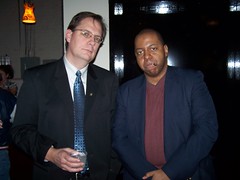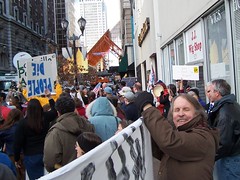Congratulations to CLOUT (Citizens of Louisville Organized and United Together) for the most excellent half page Op-Ed in today's paper! Excerpts below:…CLOUT is engaged in a campaign to "Stop the Revolving Door" that leads to and from the system, and our research clearly reveals two key facts that help explain why the system operates as it does:
The vast majority of people coming into contact with the criminal justice system suffer from the disease of drug/alcohol addiction.
The system is not placing enough focus on this reality, by providing the kind of coordinated, comprehensive therapeutic approach needed to treat the problem, and to offer alternatives to repeated incarceration.
It is a widely accepted fact that around 80 percent of those coming before the courts have a drug/alcohol problem. Due to changes in various sentencing laws over the years, the number of people being incarcerated has grown dramatically, but the programs to treat this critical contributing factor have not grown with it.
These people will eventually return to the community, and, if they have not received the treatment that they need, they are all but doomed to reoffend and spin right back into the revolving door. In fact, the current recidivism rate in Kentucky is 57 percent -- that is, over half of the people who are released from prison are convicted of another felony within two years. Again, the vast majority of these offenses can be traced back to the offenders' problems with drugs/alcohol…
There are several points at which attention is required.
One is where offenders are entering the system. It is here that alternatives to incarceration, with a focus on treatment, are needed. One such successful approach is Drug Court. The recidivism rate for Drug Court graduates is only 14 percent. The cost of the program is only $3,000 per person per year, versus more than $17,000 for incarceration. Also, for every dollar spent on Drug Court, another $5.53 is returned to the community in a more productive, contributing citizen and in avoided costs to the system.
But here's the kicker: Though there are thousands of people in Louisville Metro who could benefit from this excellent program, only 120 slots are available.
It is time for Drug Court to be taken from the level of being a novelty program in the criminal justice system to being the core business of the courts. As someone recently said, if 80 percent of those coming before the courts have a drug/alcohol problem, then a similar percentage of the system should function as drug court. Simply put, Drug Court needs to be greatly expanded…
Those of us in the Judeo-Christian tradition find in Micah 6:8 the three-part mandate stating what is required of us as God's people. Rather than elaborate systems of sacrifice and ceremony, what God requires is three basic things: that we "do justice, love mercy, and walk humbly with God." For Christians, this is echoed by Jesus in Matthew 23:23 where he refers to the "weightier matters of the law: justice, mercy and faithfulness."
The faith community in Louisville, as in most communities, does well at walking with God in humility and faithfulness. We meet weekly by the tens of thousands to worship and to learn how to live more faithfully throughout the week as individuals and as congregations.
As for mercy, the faith community of Louisville has a well-deserved national reputation for its works of charity, as exemplified in our network of ecumenical community ministries, which has become a model for how religious congregations can provide more help together than we could ever do alone. But, while ministries that address the immediate needs of individuals are a part of the biblical mandate and must be done, they should not be confused with justice ministry. As Pope John XXIII said, "What is owed in justice should never be given in charity."
When it comes to that third part of the biblical mandate -- to "do justice" -- our record is less impressive. Justice ministry addresses the systems that cause or perpetuate the immediate needs of individuals. We believe that there is much more the religious community could, and should, be doing to meet this part of the biblical mandate.
======
Complete story found
here.




